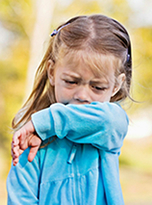Read and report vaccine reactions, harassment and failures.

H. influenzae type b (Hib), along with all H. influenzae types, including both non-b and nontypeable H. influenzae, are contagious. H. influenzae is spread by direct contact with the respiratory secretions of someone who is a carrier or is infected with H. influenzae. Less commonly, infection can be spread to newborn infants if they come into contact with genital or amniotic fluid from an infected mother during the birth process.
H. influenzae enters the body through the upper respiratory tract, and can remain there for several months without causing illness. Nontypeable strains of H. influenzae colonize in the respiratory tract of approximately 75 percent of healthy adults. Currently, Hib is believed to colonize in the back of the throat in three to five percent of children. In some individuals, the organism causes an invasive infection such as pneumonia or meningitis. Although it is not known how H. influenzae enters the bloodstream, it is possible that a co-existing viral or mycoplasma infection of the upper respiratory tract may be a contributing factor.
In general, H. influenzae disease is considered to be minimally contagious, however, if a person has close contact to someone who is infected with or is carrying H. influenzae, transmission can occur. Hib has the potential to spread quickly in populations in enclosed quarters, such as families, institutional settings, and daycare centers. Prior to the introduction of Hib vaccines in the United States, health officials had identified a seasonal pattern to Hib, with the first peak between the months of September and December, and the second peak between March and May.
IMPORTANT NOTE: NVIC encourages you to become fully informed about Haemophilus Influenzae Type B (Hib) and the Hib vaccine by reading all sections in the Table of Contents, which contain many links and resources such as the manufacturer product information inserts, and to speak with one or more trusted health care professionals before making a vaccination decision for yourself or your child. This information is for educational purposes only and is not intended as medical advice.



